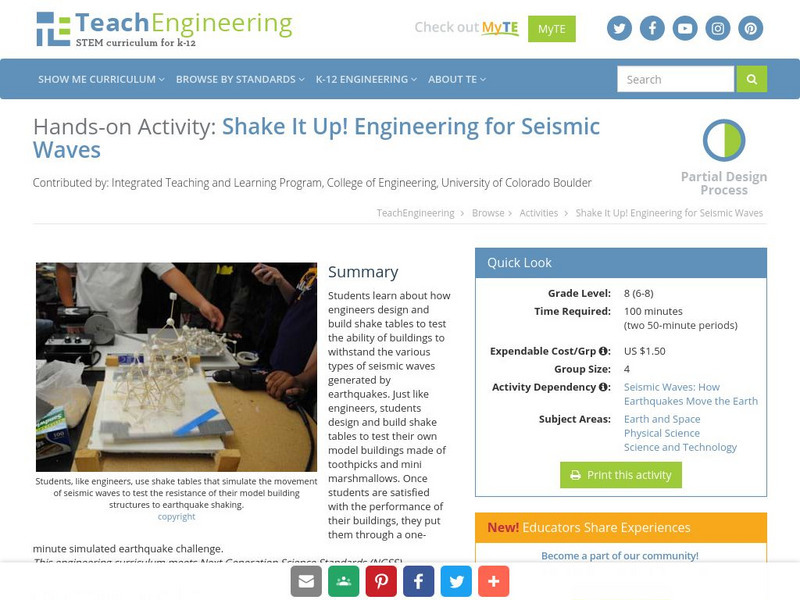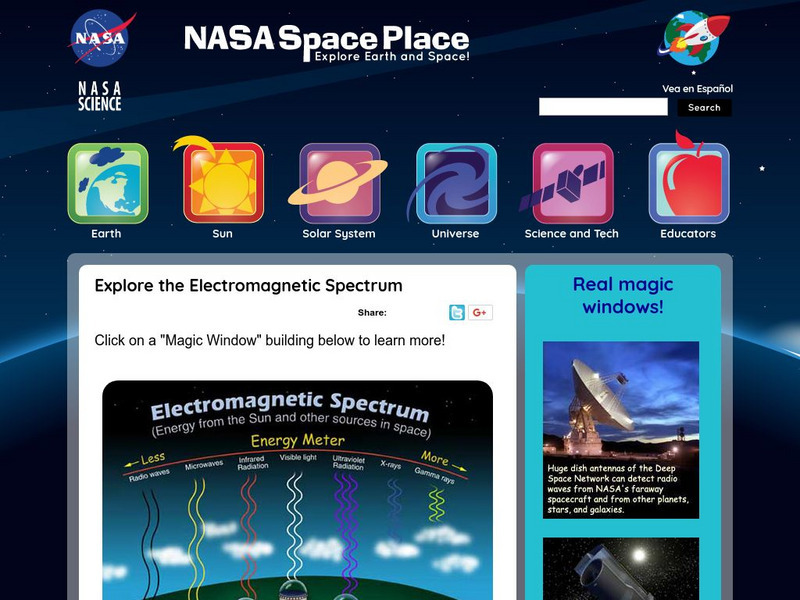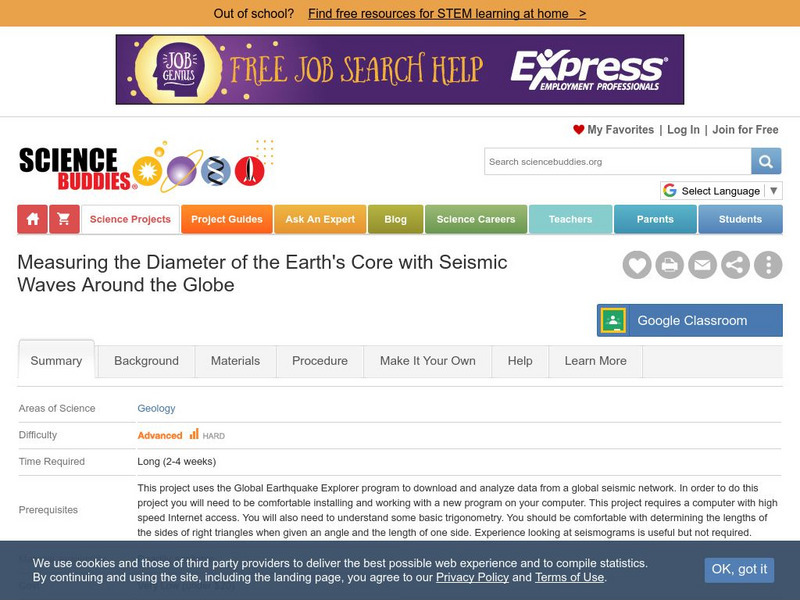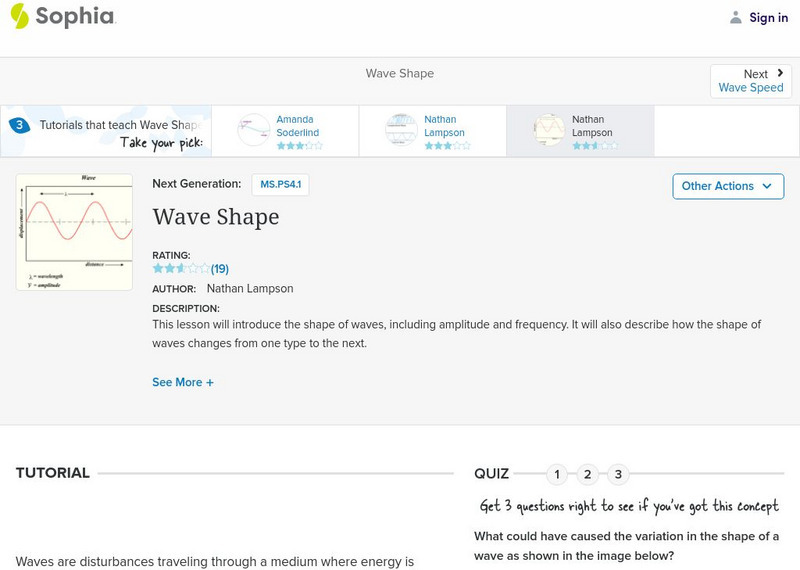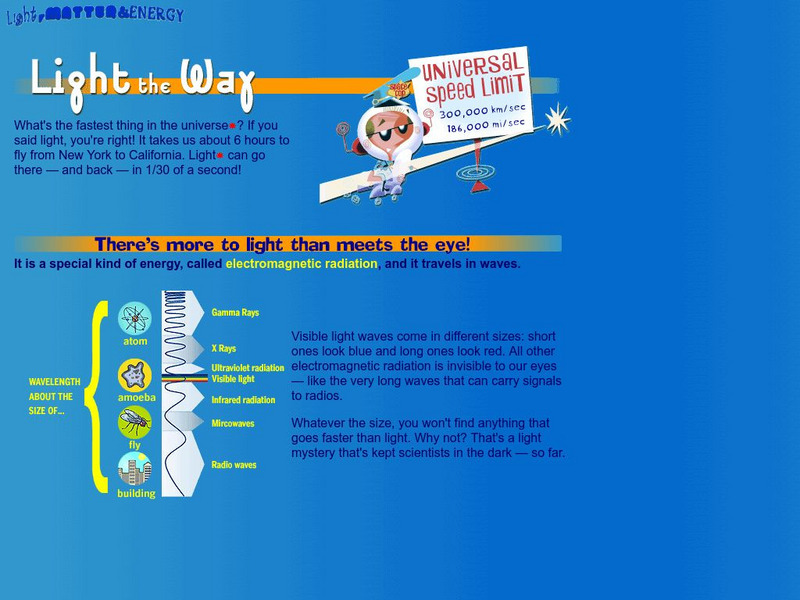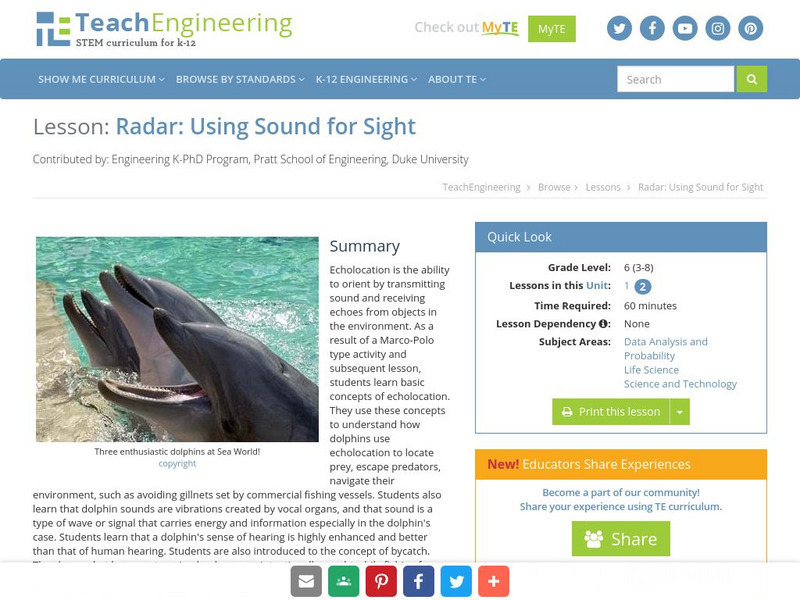Science Struck
Science Struck: Electromagnetic Waves: Origin and Theory
Discusses the history of the discovery and study of electromagnetism, the scientists who worked on it, the basic principle, how wavelength and frequency are related, and types of electromagnetic waves.
Creative Science Centre
Creative Science Centre: Wind and Wave and Other Power
A collection of links to projects and information on how to make different types of windmills, and a wave powered electricity generator.
TeachEngineering
Teach Engineering: Measuring Distance With Sound Waves
Students learn about sound waves and use them to measure distances between objects. They explore how engineers incorporate ultrasound waves into medical sonogram devices and ocean sonar equipment. Students learn about properties, sources...
TeachEngineering
Teach Engineering: Shake It Up! Engineering for Seismic Waves
Students learn about how engineers design and build shake tables to test the ability of buildings to withstand the various types of seismic waves generated by earthquakes. Just like engineers, students design and build shake tables to...
Energy4Me
Energy4me: Exploring Sound Waves
This activity explores the behavior of sound waves. Learn how to test how sound travels through different types of rock.
NASA
Nasa's the Space Place: A Trip to the Land of the Magic Windows
Explore the electromagnetic spectrum and learn about each type of energy on the spectrum.
Other
The Basics of Reading Music
This site is an overview of how to read music. The basics of notation such as note and rest values, the names of lines and spaces of both treble and bass clefs, etc. are covered. Includes downloadable audio files.
Science Buddies
Science Buddies: Measuring the Earth's Core With Seismic Waves
When an earthquake occurs, seismic shock waves travel out through the earth from the source of the event. The shock waves travel through the earth (body waves), or along the Earth's surface (surface waves), and can be recorded at remote...
Utah Education Network
Uen: Move It!
Fourth graders explore the erosive effects of waves, streams, glaciers, and wind.
Other
Nevada Seismological Laboratory: Seismic Waves
This resource describes the two different types of seismic waves and how they travel through the earth, offers diagrams of the waves, their speeds, and how seismograms are used to locate earthquakes.
Science Struck
Science Struck: A Complete List of Natural Disasters
Explains what a natural disaster is and provides a list of every type along with a short description of each.
Sophia Learning
Sophia: Wave Shape: Lesson 1
This lesson will introduce the shape of waves, including amplitude and frequency. It will also describe how the shape of waves changes from one type to the next. It is 1 of 5 in the series titled "Wave Shape."
PBS
Pbs Learning Media: The Electromagnetic Spectrum: Frontline
This video segment adapted from FRONTLINE introduces the electromagnetic spectrum and explains how the various types of electromagnetic waves are distinguished by the amount of energy each wave carries.
TeachEngineering
Teach Engineering: The Three Color Mystery
Students are introduced to an engineering challenge in which they are given a job assignment to separate three types of apples. However, they are unable to see the color differences between the apples, and as a result, they must think as...
University of Colorado
University of Colorado: Seismic Waves
Basic definitions and characteristics of the different wave types, diagrams, and speeds of the waves. Has links to information on seismology, earthquakes, and plate tectonics.
CK-12 Foundation
Ck 12: Earth Science: Seismic Waves Study Guide
[Free Registration/Login may be required to access all resource tools.] This study guide summarizes key points about types of seismic waves. Includes a few questions to check for understanding.
University of Texas at Austin
Mathematics Teks Toolkit: The Sounds of Music
In this lesson, students collect data, graph it, then determine the period and frequency of the sound waves made by a guitar.
Libre Text
Libre Texts: Physics: Electromagnetic Waves
Utilize this wiki-type page created by students and faculty members to gain a higher understanding of the electromagnetic waves. Study the equations to comprehend how different variables can affect characteristics of wavelengths.
American Museum of Natural History
American Museum of Natural History: O Logy: Light, Matter, Energy: Light the Way
What is electromagnetic radiation and how does it work? Review a captioned graphic that explains electromagnetic radiation and the visible and invisible types of radiation on the electromagnetic spectrum.
Ducksters
Ducksters: Physics for Kids: Basic Science of Waves
Kids learn about waves in the science of physics including types such as mechanical, electromagnetic, transverse, and longitudinal. Facts and examples are included.
TeachEngineering
Teach Engineering: Sound for Sight
Echolocation is the ability to orient by transmitting sound and receiving echoes from objects in the environment. As a result of a Marco-Polo type activity and subsequent lesson, students learn basic concepts of echolocation. They use...
Science Buddies
Science Buddies:testing Compression Waves
Here's a project for studying compression waves in different soil types. It uses a homemade wave tank for solids, with a frequency generator, amplifier, and loudspeaker as the vibration source. There are lots of interesting possibilities...
Michigan Technological University
Michigan Tech University: Where Do Earthquakes Happen?
An informative site that explains how and where earthquakes occur and the different types of faults. Contains maps and charts of fault lines, plate edges, and the continental plates. There are other links within the site of related...
Khan Academy
Khan Academy: The Effects of Ultrasound on Different Tissue Types
This is a five-question quiz related to the passage "The Effects of Ultrasound on Different Tissue Types."



